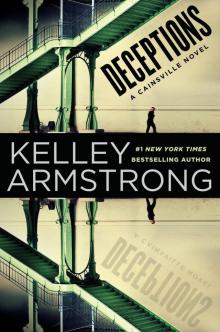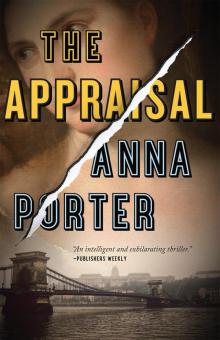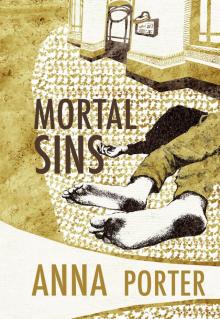- Home
- Anna Porter
Hidden Agenda Page 6
Hidden Agenda Read online
Page 6
“I was hoping you would feel that way. We all know that you cared for him.” He included Alice in the “we all.” “That is why I wanted to talk to you today.” He took a deep breath. “First of all, I am going to have to ask you to accept that I, too, cared very much for my father. You and I never came to know each other while you worked here, and I haven’t moved in your circles since. So you can’t know much about me. Yet surely you will believe me when I tell you that my father’s memory means more to me than it could possibly mean to you.” Francis talked at a calm, measured pace, his words carefully chosen.
“I know he considered your story about him to be important because he made notes in preparation for his meeting with you.” Francis tried a small smile. “I’m sure you’re aware my father hardly needed to make notes for a run-of-the mill interview. But this one was different.”
“He seemed relaxed…” Judith muttered.
“We have had a few bad years, as you know,” Francis went on. “Business has been slow, and there was little hope that he could keep his creditors on the extended payments schedule they had previously accepted. Heavy bank interest payments have continued to be too great a burden. My father could no longer cope.”
“That wasn’t the impression he gave me,” Judith said and looked at Alice for confirmation. Alice was studying her cigarette—her second since Judith had arrived.
“Of course not,” Francis resumed. “You know my father… he had great pride. But there have been some damaging stories recently. Stories that he was making deals with his authors for delayed royalties, rumors that he was about to default at the bank. He was going to use the opportunity your interview afforded him to redress the negative impression.” Francis poured himself a glass of water from the jug on the coffee table. “I believe he was planning to go out in a blaze of glory. He wanted you to write his epitaph. One that would leave his heirs with the appearance of a viable business, at least as far as the creditors were concerned, so they would not put us under when he died. He picked you because he trusted you and because he knew you would not betray him.”
Francis leaned forward slightly, his elbow resting on one knee, his right hand dangling loosely from the cuff. The nails were manicured, like Gladys’s.
“I think you will agree that he had gone to a lot of trouble to make his death appear accidental. That he didn’t entirely succeed was not for lack of trying. Many still believe that he fell rather than jumped. The police and the newspapers have been gallant enough not to express their doubts. But it would appear you are planning to draw attention to his suicide. Because he misled you into thinking that things here were in great shape, you are unwilling to accept the facts. But there is nothing that your digging will uncover. There is no mystery. All that you would achieve is to cause pain to all those my father most wanted to protect: his family, his authors and his employees.” Francis took a deep breath. “Now, I know you would not want to do that.”
Alice, who had barely moved until now, bent over the ashtray, stubbed out her cigarette and stood up. Slowly she walked over to the window and stayed there, her back to the room, looking out at the storm. Francis stretched out in his chair. The pale light from the overhead lamp caught his sharp angular features and made them even sharper. His thin nose, slightly hooked over the bridge, his pale hands hanging like talons at the ends of the long bony arms made him seem vulture-like. Only his eyes reminded Judith of his father. They were the same pale blue, deep-set in concentration, and had the same calculating yet ingenuous look.
When Judith finally spoke, her voice came out in a whisper.
“It’s very hard to believe.”
Francis nodded.
“I know how you feel.” He clinched his advantage by sympathizing with her. “That’s why I hoped I would have a chance to talk with you. The fact I want to impress upon you, Judith, is that what happened had been a long time coming. He had planned every detail. He preferred this to handing the firm over.”
“To a buyer,” Alice said from the window. She sounded unusually timid.
“I suppose you are wondering why Alice is here with me?” Francis asked.
Judith had been.
“Sheer coincidence, really,” Francis said. “I came upon her in here, searching through my father’s office. For your story, I think.”
“I have every right to be here,” Alice said.
“Of course you do,” Francis said placatingly. “And it gave us a chance to have our little chat. Most fortunate, wasn’t it?”
Alice nodded. Slowly.
“We have compared notes on a couple of things and found, I think, that we have a lot more in common than we had thought. For one thing both of us care deeply about the survival of this company. And that’s what the issue is, Judith. The real issue.” Once again Francis leaned forward, his elbows on his knees. “We have had an offer for the firm. It’s the kind of offer that would allow for a steady, calm transition to the new owner. It would give the company the necessary cash-flow to resume business as it should be. It would take the banks off our backs and newspapers out of our backyard. It’s simple, secure and realistic.”
“Who is the buyer?” Judith asked.
“You can’t expect me to tell you that. Not yet, anyway. It’s taken months of planning, and it’s the only way we can ensure a continuation of jobs here and security for the people my father cared about the most.”
“His authors.”
“His family.” Francis smiled sadly. “Though he never could tell the difference.”
“It is a generous offer,” Alice said, without conviction.
“Judith,” Francis said firmly, “my father picked you as a friend. I ask you to treat him as one. Write the story of his life, his work, his contribution to this country. Do not meddle in his financial affairs. Do not mention his suicide. Let’s keep the old man’s memory clean…”
Judith nodded a lot. She promised to think about it.
Alice saw her out. Both women were silent all the way down the corridor. Alice helped wind Judith’s long striped scarf around her neck.
“He makes me feel completely uncomfortable,” she said. “And there is something about all this that stinks.”
“Do you know who the buyer is?”
“No. But I think it’s some Brits. Couple of weeks ago Francis was dining with a bunch of them at Winston’s. George wasn’t there.”
“You don’t think Francis would want to sell the place without telling his father?”
“Who’s to say?” Alice whispered. “He had the police in here today. They haven’t found George’s briefcase. The one he always carried. Not here, not at home. Francis has turned the place upside down. He was yelling at the detectives, accusing them of incompetence.”
Judith pulled on her mittens. It would be a grim drive home.
Seven
MARSHA WAS BREATHING hard when she reached the fourth floor. Briefly, she had considered letting herself off that last test of endurance, but she had some energy left after her early-morning run and she needed to push her body sometimes. She unlocked the door, unhooked the chain, picked up the paper. Once inside, she leaned back against the door and waited for her temples to stop pounding. Then she peeled off her Roots suit and cotton underpants, threw them into the corner, plugged in the coffee maker and headed for the shower. She closed her eyes and let the water cascade through her hair and down her face, her muscles tingled with exhaustion.
She wrapped her hair in a towel, her body in a terrycloth kimono, and went to check if Jerry was awake. He wasn’t. He was lying on his stomach, his face half-buried in the pillow, clutching it as though afraid someone might take it away from him. Marsha watched him for a moment, wondering if he knew how he revealed himself in his sleep. So much need and such great fear of losing.
She sat on the edge of the bed and gently stroked his neck and ear, brushed the hair off his forehead.
“It’s time, Jerry.”
He stirred once, groaned and bur
ied his face deeper. Jerry had given her these pillows last Christmas, wrapped in Bloomingdale’s best festive paper, red ribbons. Top-quality goosefeather. He had arrived on Christmas Eve bearing boxes of gifts, champagne, caviar, poinsettias, and apologies he couldn’t stay. The family was expecting him early. He could not disappoint them again. The dinner had been planned in advance, cooked by the girls. It was all to be a surprise. Marsha had given him a fur-lined jacket, and cufflinks. They were gold, engraved with the Chinese characters for luck.
Once more she tousled his hair and ran her fingers down his neck to his shoulders, into the hollow between the muscles.
“Coffee’s waiting.”
“I’ll be right out,” he grumbled.
“Really?”
“For sure. Have I ever lied to you before?”
Jezebel wound herself around Marsha’s legs and meowed plaintively.
“OK, I’ve got the message,” Marsha told the cat and headed for the kitchen and the chicken chunks. Then she poured herself a cup of black coffee and padded into the dining room with the newspaper. Page one was busy with Pakistan’s supply of 90 percent of the US heroin trade and the Senate inquiry into the Administration’s aid to Zia’s repressive, mob-assisted military clique. With Pakistan primed to invade the Punjab, was there any certainty the President would intervene on behalf of India?
As soon as she unfolded the second page, she saw the picture. Instinctively, before she had even glanced at the headline above or the cutline below, she knew what the story would be. The photograph was of Max Grafstein, at least five or six years ago. He had not yet acquired the distinctive white streaks in his hair. Somebody must have dug this up in the archives.
The headline read: “Publisher Murdered.”
Max’s body had been found on 54th Street between Lexington and Park. His pockets were empty except for a used Air Canada ticket that identified him. He had arrived at La Guardia Airport on the 4:00 p.m. flight from Toronto. His body was found at 7:00 p.m. The medical examiner concluded Max could not have been dead more than an hour.
He had died of a steel blade through the heart. The murder weapon had been discarded at the scene. The police didn’t have much to go on, but were looking for a cab driver who might have picked him up at La Guardia. The Times literary people had compiled a hasty obit. Otherwise there would have been more auspicious mention of Max’s brilliant career.
For a long time Marsha stared at the picture, motionless. She tried to remember Max as she had last seen him, tall, proud, self-assured. Max joking with agents at the ABA, talking big numbers, laughing when caught in an exaggeration. Axel had occupied five booths on each side of the aisle. They had brought man-size posters of their leading authors, a complete outer-space environment for the science fiction list they were launching in the Fall and a crateful of white doves they had let go at noon to celebrate The Year of the Dove, their Big Book of the season. Max had loved the action, the press gathering around him, the young bookstore clerks from Wisconsin who asked for his autograph. He had enjoyed being the center of attention, generating gossip, proud of his successes.
There were times Marsha had envied his style, the ease with which he made his presence felt. He had seemed indestructible. A steel blade through the heart…
“One piece of toast or two?” Jerry called from the kitchen. When she didn’t reply, he came in. He had wrapped himself in a big white towel and was still dripping from the shower.
“Up bright and early as usual.” He stroked Marsha’s hair, then looked at her face more closely. “And already you’re worried about something.”
“Somebody I knew died last night.”
“Who?”
She pushed the paper toward him.
“Max Grafstein?” Jerry let out a sigh and settled into a chair. He modestly crossed his legs. “City’s turning into a goddamn hellhole. Nowhere’s safe anymore. No one…”
“On the 4:00 p.m. flight from Toronto,” Marsha read over his shoulder. So he would have been coming back from George Harris’s funeral. George Harris. Now Max. She reached for the phone. “He’s the second publisher I know died this week,” she said.
“Starting a count, are you?” said Jerry.
“Don’t be so flippant. I’m in the same business. Max was almost a friend.”
She watched Jerry unfold the paper, marveling at how he could speed-read several columns at one time.
She dialed Judith’s number.
The voice in Toronto was grouchy but awake. Judith had been up for a while, sitting in bed contemplating her George Harris assignment. She had finished the body of the story, but had no idea how to end it.
“Judith! You awake?” Marsha asked.
“More or less. I’ve been hoping you’d call. I’m having trouble with the story. It’s Francis Harris. He told me yesterday…”
“Judith, Max Grafstein has been murdered,” Marsha cut in.
“No! Max? When? How?”
“It’s in this morning’s Times. He was robbed and killed an hour or two after he came back from Toronto. Did you see him there? At the funeral?”
“Sure I saw him. We had drinks after the funeral. I asked him about George…” Judith paused. “Do they know who did it?”
“No. It seems to be just another run-of-the-mill downtown mugging.”
“But that’s terrible.” Judith let out a long sigh. The awful finality of one more death. Tall, elegant Max looking at her over the bill, patronizing.
There was a long silence and Jerry poured more coffee.
“Judith, are you still there?”
“Uhum. I’m thinking.”
“You’re coming down tonight?”
“Yes. I think I’ll shelve the ending. I can’t handle it now anyway.”
“You’ll be here for dinner?”
“Yes. You knew him well, didn’t you?”
“Nobody knew Max well. Not even his wives. I worked with him before he went to Axel. He was one hell of a publisher. I don’t remember when he last made a wrong move.”
“Last night,” Jerry suggested, but Marsha wasn’t listening. She had put the receiver back, but kept her hand on it, staring out the window.
Jerry folded the paper and pushed his chair back.
“I’m sure you won’t want to know about it, but Nicaragua has been left to the Sandinistas after all. The Democratic Force has just folded its tents. Looks like the State Department is bailing out. Power of public opinion.” He’d tried. “Well, is Judith coming?”
Marsha said yes.
“She doesn’t like me much, does she?”
“No. She doesn’t. But she doesn’t know you much.”
“You think she’d change her mind if she got to know me better?”
“She’d find you irresistible.” She’d like him even less, Marsha thought, but their taste in men differed. Judith loved strong men who could, should the need arise, protect her. Luckily, the need hadn’t arisen. Marsha was sure none of them would have been equal to the challenge. Marsha looked for men she could talk to. She needed companionship more than romance. At least, that’s what she had come to believe from observing her parents’ marriage. With Jerry there was no danger of running out of conversation, and he needed her for comfort.
“He’s too needy,” Judith had said. “Now he’s got his expensive downtown analyst, and he’s got you for free. He’s laying the burdens of his lousy marriage on you, trying to share the guilt.” But Marsha hadn’t shared the guilt. Kate had never seemed real to her—she was part of Jerry’s pattern of fears and self-doubt; part of his delusion of the beautiful home and adoring wife who busied herself with a variety of good works in Connecticut and rarely embarrassed him by asking questions about his life away from home. Sometimes Marsha wondered how his daughters viewed him. He had such a distant, appraising sense of them, as if he had nurtured a houseful of strangers. Not that he didn’t like them, but they weren’t part of him.
Perhaps she had chosen him because he was
married. It meant they were not accountable to each other. No legal paraphernalia, no chance of messy divorces, no battles over property, no burning passion. Marsha felt no jealousy, no need to declare any sense of togetherness. Indeed she had a fear of belonging. Maybe that, too, was rooted in her childhood; knowing that she could never quite count on her parents being there when she needed them. For her father, the Service had come first. For her mother, possibly, beautiful things and important people.
“You won’t have dinner with me, then,” Jerry said, a little hurt creeping into his voice.
Marsha slipped behind him and wrapped her arms around his neck, her face lowered into the crevice between his neck and shoulder, her hands brushing the rough, curly hairs on his chest. Her fingers settled and tugged, gently.
“I guess I’ll just have to make do with another woman,” Jerry whispered and held onto her hands for a minute, squeezing them in against his body. Then he reached up over his shoulder and cupped one of her breasts. It felt smooth and cool inside the kimono, and fitted the palm of his hand perfectly. Marsha kissed the side of his neck in that soft warm place just under the ear, came around and lowered herself onto his knees. Her hands slid to the back of his head and she held him tight, pulling down toward her as his arms encircled her.
Eight
JUDITH DRESSED QUICKLY and carefully. Today would be fashionable but restrained: a beige-and-navy-print light wool suit, tie belt, a maroon silk scarf, navy high-heeled boots. For her face a thin layer of beige foundation, a touch of rouge—gray-shade eyeshadow, emphasis on the eyes. Jungle-cat eyes, James had called them. But in the end, it had been she who needed shelter.
As Judith entered police headquarters on Jarvis, south of Bloor, she took a deep breath to settle the tremor in her belly and smiled quietly to herself. She felt unaccountably confident.
The constable at the reception desk was impressed. He bristled with showy efficiency as he dialed David Parr’s extension.

 Deceptions
Deceptions Hidden Agenda
Hidden Agenda The Appraisal
The Appraisal Mortal Sins
Mortal Sins In Other Words
In Other Words